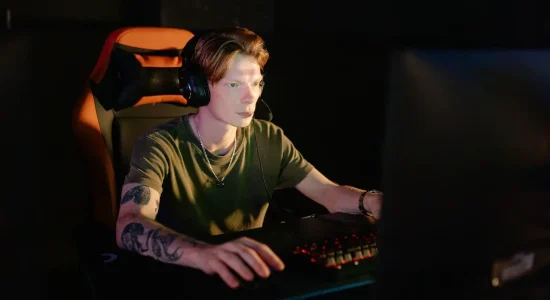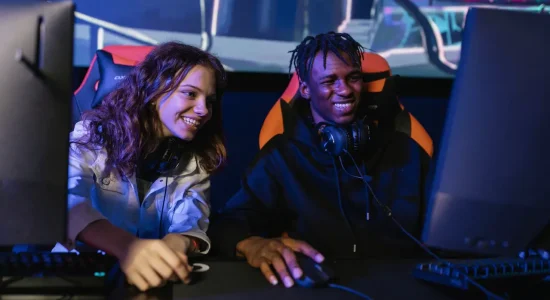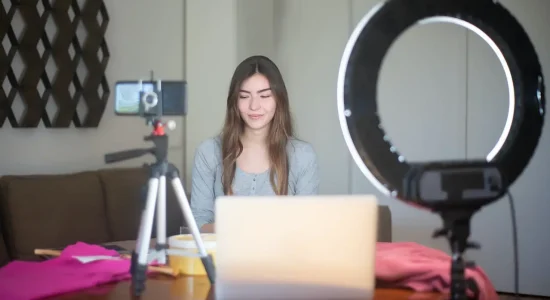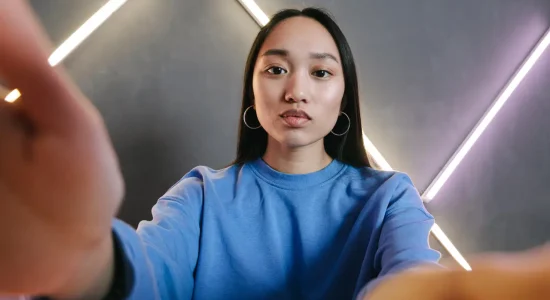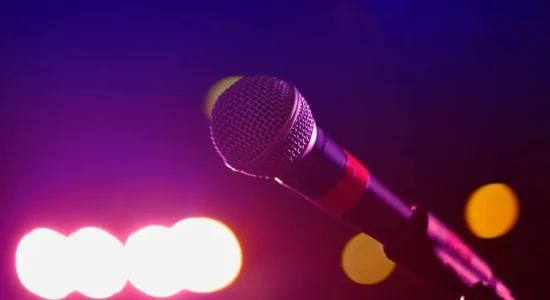If you’re a fan of watching streams, you may occasionally notice the streamer is listening to popular songs, seemingly without fear of getting flagged for violating the Digital Millennium Copyright Act. How are these streamers getting away with playing copyrighted music?
Big streamers who play copyrighted music are doing so illegally, but it is difficult for streaming platforms to detect this violation when the streamer is live. Therefore, the streamers often don’t face any consequences.
In the rest of this article, I’ll discuss how streamers get away with playing copyrighted music, and I’ll also detail Twitch’s music guidelines and the consequences of violating these rules.
It is possible to PAY for copyrighted music to use in YouTube videos. Services like Lickd.co offer the option to pay for each track to use in a video.
I also discuss some copyright-free music sources, and highlight other Twitch guidelines to keep in mind when using the platform.
What Happens When Streamers Play Copyrighted Music
According to the Digital Millennium Copyright Act (DMCA), it is illegal to play copyrighted content, including music, without the consent of the company that owns the content. For a streamer to play copyrighted music legally, they need to have the consent of the recording company.
Often, it is not even enough to have the permission of the individual artist. The recording company owns the song, so the company has to give consent.
Therefore, streamers who play copyrighted music during their streams are most likely doing so illegally. As a result, they are risking the status of their streaming account and could face legal action.
However, many streamers get away with playing copyrighted music without facing legal consequences because it is difficult for live streaming platforms to scrape live streams and detect copyright infringement. Scraping is when a company uses bots to extract content.
Twitch, the most popular live streaming platform, uses scraping bots to collect data from live streams and look for copyright infringement and other violations. If the bot catches a streamer using copyrighted music, Twitch can issue punishment.
Currently, there are more streams than bots, so it is unlikely that a streamer will be caught if they are playing copyrighted music.
Many streamers separate their audio sources for their gameplay from their music. This allows them to upload Videos on Demand (VODs) without the copyrighted music present. Scraping bots are better at screening VODs for copyrighted content than live streams.
To keep copyrighted music out of VODs, streamers need the following software:
- OBS Studio
- Voicemeeter Banana or Potato
- Windows 10 or 11, or Audiorouter
Still, using copyrighted content, including music, without permission is illegal. Streamers who play copyrighted music are risking disciplinary action, and may even face lawsuits.
Some streamers may decide that playing copyrighted music is worth the risk, especially if the music enhances their viewership and earns them more Twitch Bits. Entertaining music may incentivize others to follow, helping the streamer reach 100 or more followers quicker.
The consequences of copyright infringement can be harsh, though, and they risk losing their account completely.
Even though most streamers are breaking the law, not all of them are. If a streamer is big enough, they can ask recording companies and management permission to use the music. If they are granted permission, they can freely play the music without worry.
Twitch Music Guidelines
Many people enjoy playing music on Twitch, so you may be a bit confused about the rules around doing so. Let’s take a look at Twitch’s music guidelines and the consequences of breaking the rules:
- It is illegal to play copyrighted music on your stream without the consent of the recording company and a license. This rule is based on DMCA guidelines. Because Twitch is deemed a “public place,” a license is required to play music to an audience.
- VODs that violate copyright laws will be muted. Scraping bots that identify an infringement in a VOD will alert Twitch, and the company will then mute the offending video.
- Streamers may receive 24-hour bans for copyright infringement.
- Clips of streams that feature copyrighted music will be taken down.
- After three copyright strikes, your channel is deleted. There is no way to recover a Twitch account that has been deleted because of copyright violations.
The only music streamers are legally allowed to play is music that is copyright-free or music that they’ve been permitted to play for an audience. This includes:
- Music the streamer owns themselves
- Music the streamer has a license from a label to play
- Music that is part of the Twitch soundtrack
- NoCopyrightSounds
If you pay for a music service, such as Spotify, Amazon Music, or YouTube Music, this does not give you the right to play music from these services during a stream.
Paying for these services gives you the license to listen to the music on one or more personal devices, but it doesn’t give you the right to broadcast it to an audience.
This confusion led to many streamers facing punishment in the DMCA takedowns in the second half of 2020. During this time, Twitch deleted a lot of content that violated music copyright laws.
What are NoCopyrightSounds?
In the previous section, I mentioned that one of the types of music streamers can play is NoCopyrightSounds – what is this?
NoCopyrightSounds is a record label that releases copyright-free electronic dance music. Streamers can use music from this label without fear of violating the DMCA.
NoCopyrightSounds (NCS) began as a YouTube channel by a gamer named Billy Woodford. Nowadays, the label allows streamers to use its music as long as they give credit. Streamers can use any music from this label without risking punishment for violating the DMCA.
NCS is the leader in copyright-free music labels. In 2017, NCS reached the milestone of $1 million in transactions, even though the label releases music for free.
The NoCopyrightSounds YouTube channel has over 30 million subscribers and 10 billion views.
Popular NCS artists include:
- Alan Walker
- Cartoon
- Janji
- DEAF KEV
- Lost Sky
- Unknown Brain
- Jim Yosef
- Electro-Light
- Syn Cole
If you’re a streamer and want to incorporate music in your streams legally, NCS is a great resource. The label offers a variety of EDM genres, so you’ll likely be able to find an artist that suits your taste.
What Is Twitch Soundtrack?
A Twitch Soundtrack is a tool featuring a library of music that is licensed for worldwide listening on live Twitch streams. It allows streamers to feature music legally and helps artists build a fanbase from the Twitch community.
The library features a variety of music, including electronic, lo-fi, instrumental, and other genres. Therefore, it is easy for streamers to find a song that suits their taste and vibe. Soundtrack is available as an app and as a web player.
Music from Twitch Soundtrack is intended for live streams only, so you cannot use it for VODs if the tool is configured correctly.
Where Can I Find Copyright-Free Music?
You can find copyright-free music on websites such as PremiumBeat, Artlist, Music Vine, Soundstripe, Epidemic Sound, Bensound, and ccMixter. If you’re a streamer, you can use music from these sites in your live streams.
These are the popular and highly regarded websites for copyright-free music but if you’ve never sought this kind of music before, you might be confused about which option is best for you.
In the table below, I have explained why these websites are top choices for copyright-free music, and what makes them unique:
| Website | Why I Recommend It |
| PremiumBeat | One of the biggest collections of royalty-free music available Over 10,000 tracks You can search by genre, mood, artists, instruments, and duration Editor’s Pick playlist features 857 great tracks |
| Artlist | Features original tracks from talented indie artists There are many filters you can use to find the right soundCurates themed collections of tracks Regularly spotlights their artists’ albums, so it’s easy to discover new music |
| Music Vine | Features over 160 independent musicians There are more than 2,500 tracks to choose from You can filter by style, mood, vocals, and duration Dedicates part of their website to their artists, allowing you to explore their music |
| Soundstripe | Features more than 80 artists There are many filters you can use to find the right soundOver 50 curated playlists organized by genre You can create an account to follow artists, like songs, and make your own playlists Includes 29 categories of sound effects |
| Epidemic Sound | Over 35,000 soundtrack music tracks and 90,000 sound effects Users can remove layers of a track to create their own unique sound You can filter by genre, mood, movement, energy, tempo, and duration Epidemic Sound song finder allows you to find new releases |
| Bensound | Over 300 acoustic, folk, cinematic, pop, electronica, groove, jazz, and urban tracks You can search by genre and mood Features trending tracks to help you discover new music and artists |
| ccMixter | Musicians upload original samples of their instrumentals and singers upload original acapella recordings, and then producers mix the music together for unique and original tracks Over 120 tracks |
If you spend some time pursuing these websites, you’re sure to find music that suits your taste, and some that you can legally use during a live stream.
Other Twitch Guidelines
Being part of an online community like Twitch means you must abide by their guidelines, and prohibiting the use of copyrighted music is just one of Twitch’s many rules.
Here are some other guidelines that you should be aware of:
- You cannot artificially inflate your viewer stats. This means that you cannot buy fake followers or bots to increase your viewer statistics. If you do so, you risk suspension or a permanent ban from the platform.
- You cannot break the law or encourage others to break the law. This should go without saying, but all local, national, and international laws must be respected during a stream. This is where the DMCA violations come into play.
- You cannot attempt to circumvent a suspension. If your account does get suspended for whatever reason, you cannot use another account or appear on another user’s account.
- You cannot knowingly feature a suspended user. Similarly, if you feature someone whose account is suspended, you risk facing punishment yourself. If a suspended user appears in a gaming tournament, you must remove or mute them.
- You cannot discuss or broadcast anything that promotes or encourages self-destructive behavior. Any acts of self-harm are strictly prohibited. Furthermore, any glorification or promotion of self-harm is prohibited.
- There is a zero-tolerance policy for acts or threats of violence. Accounts that attempt or threaten physical harm are indefinitely suspended. This includes any promotion of extremist propaganda.
- Hateful conduct and harassment are prohibited. This includes any behavior that encourages discrimination or violence based on race, ethnicity, caste, national origin, immigration status, religion, sex, gender, gender identity, sexual orientation, or disability.
- You cannot share any content that reveals private personal information about others without their permission. This includes sharing someone’s real name, location, or social profile.
- You cannot impersonate someone else. Any misrepresentation of yourself will result in an indefinite suspension.
- You cannot use an inappropriate username. Usernames cannot include violence, harassment, private information, glorification of tragedy, self-destructive language, references to drugs, or references to sexual acts and genitalia.
- You cannot spread misinformation. Users who dedicate their streams to sharing widely disproven and harmful misinformation topics are banned from the platform.
- Nudity and sexually explicit content is strictly prohibited. Any content that promotes sexual violence is reported to law enforcement, and child exploitation is reported via the National Center for Missing and Exploited Children (NCMEC).
- You cannot deliberately label your content inaccurately. You should be mindful of choosing the most accurate categories and tags for your content.
- You can’t cheat in online games. This includes hacking, tampering, and exploiting another streamer’s live broadcast.
Losing a Twitch account, whether temporary or permanent, can devastate a serious streamer. Therefore, it is important to be aware of and respectful of the community guidelines.
Final Thoughts
Playing music during a stream is a great way to entertain viewers. However, it’s illegal to play copyrighted music without official consent from the recording company. Therefore, streamers who play copyrighted music during streams are doing so illegally and risk legal consequences.


